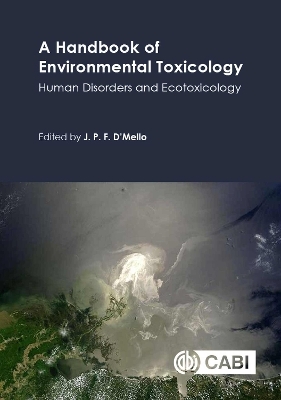
Handbook of Environmental Toxicology, A
CABI Publishing (Verlag)
978-1-78639-467-5 (ISBN)
A Handbook of Environmental Toxicology focuses on two key aspects: human disorders and ecotoxicology as affected by major toxins originating from biological sources and pollutants, as well as radiation generated spontaneously or as a result of anthropogenic activity. A diverse array of these potentially harmful agents regularly appear in the atmosphere, soil, water and food, compromising both human health and biodiversity in natural and managed ecosystems. This book: - provides authoritative reviews together with specialist short communications to complement the main chapters and address contemporary issues with important case studies; - explores the cutting edge of research and also indicates the likely direction of future developments; - contains extensive coverage of toxicants that are of significant current interest and will be of increasing concern for many years to come; and - encourages international cooperation in future research on pollution and other environmental agents causing harm to human health and degradation of natural habitats in the ecosystem. Written by an international team of authors from a range of educational, medical and research establishments, this book is an essential reference for advanced students and researchers in the areas of environmental sciences, ecology, agriculture, environmental health and medicine, in addition to industry and government personnel responsible for environmental regulations and directives.
J.P.F. D'Mello is a double graduate of the University of Nottingham, obtaining a BSc Honours in 1964 and a PhD in 1967, both in the Department of Applied Biochemistry. He began work at the Edinburgh School of Agriculture in 1968, lecturing to students and commencing research with grants from the Agricultural Research Council, Tropical Products Institute (ODA), BP and ICI. He has supervised a number of Honours, MSc and PhD students during his years at Edinburgh, published extensively in refereed journals, and took charge of the Environmental Protection and Management degree course for four years until retirement. Since retiring, he has edited 5 books for CABI, with A Handbook of Environmental Toxicology: Human Disorders and Ecotoxicology published in December 2019 and the authored text Introduction to Environmental Toxicology publishing in late 2020.
PART I: BIOGENIC COMPOUNDS 1: Phytotoxins 2: Mycotoxins 3: Cyanobacterial Toxins 4: Amino Acids and Peptides as Mediators of Abiotic Stress Tolerance in Higher Plants PART II: AMBIENT GASES AFFECTING HUMAN HEALTH AND ADAPTATION IN HIGHER PLANTS 5: Ozone I. Human Disorders: an Overview 6: Ozone II. Biophysical Observations 7: Nitrogen Dioxide: Ambient Exposure in Human Disorders 8: Sulfur Dioxide and Human Disorders 9: Plant Response to Acid Rain Stress PART III: PERSISTENT ORGANIC POLLUTANTS 10: Polycyclic Aromatic Hydrocarbons: Ecotoxicity in the Aquatic Environment and Implications for Human Health 11: The Developmental Neurotoxicity of Polychlorinated Biphenyls: a Continuing Environmental Health Concern 12: Dioxins I. Dynamics and Legal Directives in Europe 13: Dioxins II. Human Exposure and Health Risks 14: Dioxins III. Relationship to Pre-Diabetes, Diabetes and Diabetic Nephropathy 15: Environmental Endocrine-Disrupting Chemicals and Human Health 16: Organochlorine Insecticides: Neurotoxicity 17: Organophosphates I. Human Health Effects and Implications for the Environment: an Overview 18: Organophosphates II. Neurobehavioural Problems Following Low-Level Exposure: Methodological Considerations for Future Research 19: Glyphosate as a Glycine Analogue PART IV: PETROLEUM POLLUTION 20: Crude Oil Pollution I. Deepwater Horizon Contamination: Human Health Effects and Health Risk Assessments, a Case Study 21: Crude Oil Pollution II. Effects of the Deepwater Horizon Contamination on Sediment Toxicity in the Gulf of Mexico 22: Crude Oil Pollution III. Exxon Valdez Contamination: Ecological Recovery, a Case Study 23: Review of Studies of Composition, Toxicology and Human Health Impacts of Wastewater from Unconventional Oil and Gas Development from Shale PART V: TOXICOLOGY OF HEAVY METALS 24: Minamata Disease and Methylmercury Exposure 25: Lead Poisoning 26: Cadmium I. Exposure and Human Health Effects: an Overview 27: Cadmium II. Cardiovascular Effects of Human Exposure to Cadmium: Left Ventricular Structure and Function PART VI: PARTICULATES AND PLASTICS 28: Particulates from Combustion Sources: Formation, Characteristics and Toxic Hazards 29: Assessment of the Ecotoxicity of Airborne Particulate Matter 30: Toxicity of Microplastics in the Marine Environment PART VII: RADIATION RISKS 31: UV Exposure and Skin Protective Effects of Plant Polyphenols 32: Radon I. Lung Cancer Risks 33: Radon II. Leukaemia or CNS Cancer Risks Among Children 34: Fukushima Nuclear Accident: Potential Health Effects Inferred from Butterfly and Human Cases PART VIII: REMEDIATION 35: Microbial Remediation of Contaminated Soils 36: Metallic Iron for Environmental Remediation: Prospects and Limitations 37: Remediation of Contaminated Soil by Biochar PART IX: OUTLOOK AND CONCLUSIONS 38: Environmental Regulations in China 39: 21st Century Toxicology: Methods for Environmental Toxicology and Monitoring 40: Unequivocal Evidence Associating Environmental Contaminants and Pollutants with Human Morbidity and Ecological Degradation
| Erscheinungsdatum | 10.12.2019 |
|---|---|
| Co-Autor | Arturo Aburto-Medina, L. Agullo-Chazarra, Shama Ahmad, A. Ahmad |
| Verlagsort | Wallingford |
| Sprache | englisch |
| Maße | 172 x 244 mm |
| Themenwelt | Medizin / Pharmazie ► Medizinische Fachgebiete ► Arbeits- / Sozial- / Umweltmedizin |
| Studium ► Querschnittsbereiche ► Klinische Umweltmedizin | |
| Naturwissenschaften ► Biologie ► Ökologie / Naturschutz | |
| Technik ► Umwelttechnik / Biotechnologie | |
| ISBN-10 | 1-78639-467-7 / 1786394677 |
| ISBN-13 | 978-1-78639-467-5 / 9781786394675 |
| Zustand | Neuware |
| Haben Sie eine Frage zum Produkt? |
aus dem Bereich


